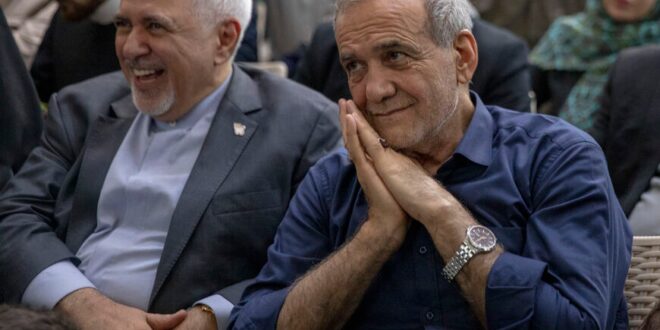Iran’s president-elect, Masoud Pezeshkian, says he wants to negotiate with the United States, but is the feeling mutual?
The recent election of a little-known Reformist as Iran’s next president could keep the door open for diplomacy over the country’s nuclear program should the winner of the US presidential election in November choose to renew talks.
Masoud Pezeshkian, a 69-year-old cardiac surgeon, former health minister and current member of Parliament, won 53% of the vote in a runoff election Friday to replace Ebrahim Raisi, the ultraconservative former president who died in a May helicopter crash.
Pezeshkian defeated Saeed Jalili, a former nuclear negotiator who staunchly opposes outreach to the West and whose critics warned he would usher in Taliban-style restrictions on society. By comparison, Pezeshkian is a relative moderate within Iran’s Shiite theocracy and has pledged to ease social restrictions, including enforcement of the hijab requirement for women.
During the brief campaign, Pezeshkian said he would negotiate directly with the United States to lift the sanctions that have taken a major toll on Iran’s economy.
“I have come … to seek lasting peace and tranquility and cooperation in the region, as well as dialogue and constructive interaction with the world,” Pezeshkian said in a speech Saturday.
His campaign promises of greater engagement with the outside world will be tested in a system where the parliament is dominated by hard-liners and Supreme Leader Ayatollah Ali Khamenei has final say on all matters of state.
But the very fact that Iran’s leadership allowed a Reformist candidate to win for the first time since 2001 suggests there’s an understanding that some kind of course correction is needed, said Ali Vaez, the Iran project director for the International Crisis Group.
“There’s more political will now in Tehran for some sort of an understanding with the West that would usher in some economic reprieve,” said Vaez.
Pezeshkian has called for a revival of the 2015 nuclear accord between Iran and world powers that set strict limits on Iran’s nuclear activities in exchange for the removal of international sanctions.
Iran has gradually expanded its nuclear program since former President Donald Trump pulled the United States out of the deal in 2018 and reimposed punitive sanctions on the country’s oil industry and financial sector. The United States now estimates that Tehran’s so-called breakout period — the time needed to amass enough fissile material for one nuclear bomb, if it chooses to do so — has gone from one year to “weeks or less.”
“Let’s let him take office first,” State Department spokesperson Matthew Miller said Monday when asked about renewed nuclear diplomacy under Pezeshkian.
“Diplomacy is the most effective way to achieve an effective, sustainable solution with regard to Iran’s nuclear program,” Miller said. “But we have also made clear that we are far from any kind of meaningful diplomatic resolution right now given Iran’s escalation across the board.”
Tensions with the West have run high over Iran’s supply of armed drones that have fueled Russia’s war in Ukraine. In one of his first calls after clinching victory, Pezeshkian phoned Russian President Vladimir Putin to reassure him of Tehran’s support for Moscow.
The president-elect also signaled there would be no change in Iran’s backing of Middle East proxies, whose attacks since Oct. 7 have raised the specter of wider war in the region. He wrote in a letter to Hezbollah leader Hassan Nasrallah Monday that “support for resistance groups will continue vigorously.”
Iran-aligned factions in Syria and Iraq have curtailed their attacks on US forces, but Lebanese militant group Hezbollah continues trading fire with Israel and the Houthi rebels in Yemen are waging a monthslong campaign of attacks on maritime trade in the Red Sea and nearby waters. Over the past year, senior US officials have held multiple rounds of indirect talks in Oman with their Iranian counterparts aimed at lowering the temperature.
Vali Nasr, a professor of international affairs and Middle East studies at Johns Hopkins University, said that sanctions-battered Iran remains incentivized to continue those talks with the United States.
“Pezeshkian’s starting position essentially is to find ways to engage the West,” said Nasr. “The reality is that the Supreme Leader has been open to a serious diplomatic effort. That’s why he gave a go-ahead to the Raisi government to engage in Vienna.”
President Joe Biden came into office promising to restore the tattered nuclear agreement and after more than a year of indirect talks in the Austrian capital, a deal appeared within reach.
 Eurasia Press & News
Eurasia Press & News



